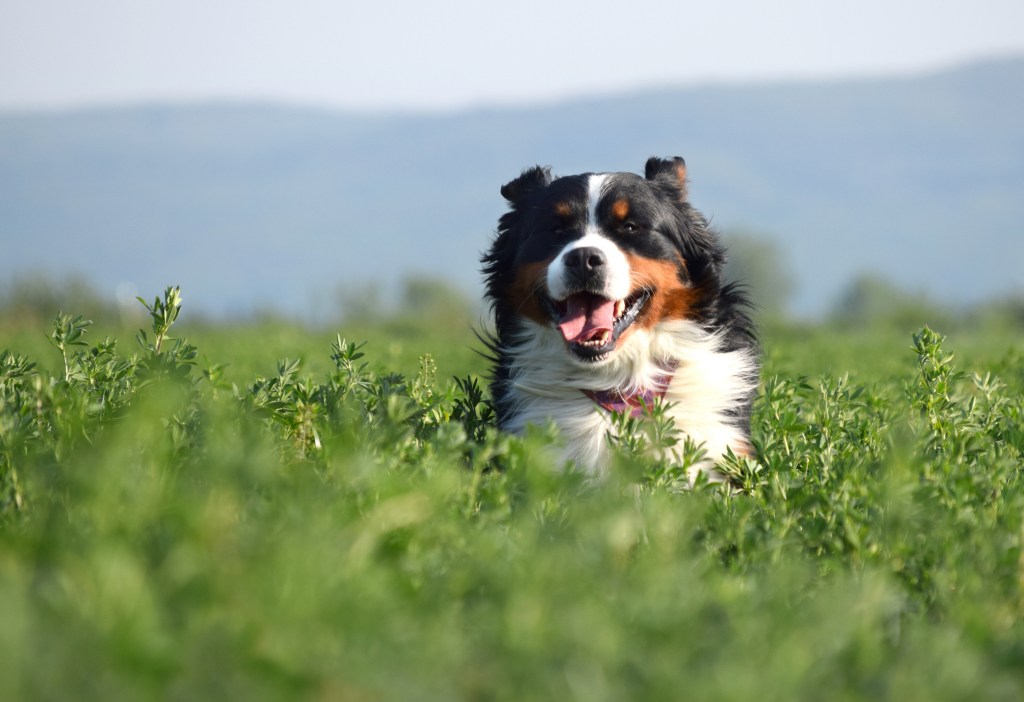The Bernese Mountain Dog, originating from Switzerland, is a large dog breed known for their gentle nature and distinctive tricolor coat. With a well-muscled build, Berners have a regal appearance, broad head, expressive eyes, and a bushy tail. Always affectionate, they are ready with a goofy smile, a love of children, and a strong sense of loyalty. Unfortunately, these devoted dogs have tragically short lifespans.
What is the lifespan of a Bernese Mountain Dog?
The Bernese Mountain Dog lifespan is between six and eight years long. This is roughly four to six years less than other large dog breeds approximate in size. However, some sources suggest their lifespans may last longer. Unexpected or sudden passing from cancer, bloat, renal failure, immune challenges, heart disease, and a myriad of other conditions have broken the hearts of many pet parents. That said, Berners remain popular as pets.
The problem with purebreds

Although the breed once faced extinction in the 1800s, the Bernese Mountain Dog rose in popularity in the latter half of the 20th century, likely due to the increased attention on the Saint Bernard, another large Swiss working breed. This newfound attention and a rise in dog shows contributed to the spotlight on the Berner. The popularity of dog shows led to societal pressure for purebred breeding, restricting the gene pool with closed stud books.
Closing a stud book on a breed means that only dogs born to registered parents of the same breed can be registered. This closure, aimed at maintaining breed purity, can lead to challenges like inbreeding. With a finite number of dogs in any purebred breed, closing the stud book restricts the gene pool. While crossbreeding was once acceptable for acquiring desired traits, the shift to closed stud books limits genetic diversity, contributing to health concerns in purebred dogs.
As Bernese Mountain Dogs grew in popularity commercially and in elite dog shows, breeders also maximized profit potential. Because of unethical breeding practices and closed stud books, predisposed hereditary conditions became more common as genetic lines were inbred. As a result, Bernese Mountain Dog lifespans were shortened.
Common health issues
One of the most common health concerns Bernese Mountain Dogs face is hip dysplasia, a genetic condition where the hip joint doesn’t fit properly into the hip socket, leading to arthritis and pain. Elbow dysplasia is another orthopedic issue that can affect Berners, causing lameness and discomfort. These conditions may be exacerbated by the breed’s rapid growth during puppyhood, emphasizing the importance of a controlled diet and exercise regimen to support proper bone and joint development. Bernese Mountain Dogs are also susceptible to certain hereditary conditions, such as progressive retinal atrophy (PRA), a degenerative eye disorder that can lead to blindness. Berners also face a risk for cardiac and autoimmune conditions.
Another prevalent concern associated with the breed is their predisposition for cancer. In particular, Berners face a higher risk for histiocytic sarcoma, an aggressive form of canine cancer. Histiocytic sarcoma originates from histiocytes, cells that play a role in the immune system. This cancer affects various organs, such as the spleen, liver, and lungs. Even with aggressive treatment, life expectancy may only be 12 to 18 months. Often, survival time is much shorter. Ongoing research is focused on understanding the genetic factors and potential preventive measures.
How to extend your Bernese Mountain Dog’s lifespan

Currently, breed preservationists are working to extend the lifespan of these remarkable dogs through genetic testing and ethical breeding practices. Some organizations hope to extend the life of Berners by outcrossing the breed or breeding the Bernese Mountain Dog with similar breeds, then breeding these more diverse genetic lines back to the Bernese Mountain Dog.
While breed organizations like the American Kennel Club (AKC) deny registration to outcrossed Berners, these organizations hope to maintain the breed’s appearance and qualities while helping to increase its health. For many, a longer life is more important than pedigree. Through outcrossing, genetic diversity may help extend the lifespan of Berners and decrease the risk for sometimes fatal conditions.
In the meantime, veterinarians suggest Berner owners can help extend their Bernese Mountain Dog’s lifespan through wellness practices, including regular veterinary care, physical and mental stimulation, weight management, and a healthy diet.
Veterinary care
Cultivating a stable and ongoing relationship with a reputable veterinarian is paramount for the overall well-being of your Bernese Mountain Dog. Regular veterinary care, including routine check-ups, vaccinations, and preventive measures, is essential. These may help identify and address potential health concerns in the early stages, ensuring a longer and healthier life for your beloved pup.
As your Berner moves through life stages, the importance of consistent veterinary attention increases. Aging dogs may require more frequent visits to the vet to closely monitor their health and make necessary adjustments to their care routine. These regular check-ups become instrumental in proactively managing any age-related issues, maintaining optimal health, and fostering a strong bond between you and your aging pup.
Diet and weight management
Your Bernese Mountain Dog’s well-being involves providing a nutritionally balanced, high-quality diet. It is advisable to seek guidance from your veterinarian to tailor the optimal food plan for your Berner, considering factors such as age, weight, activity level, and any specific dietary requirements or restrictions. Your vet can recommend a suitable commercial dog food or advise on a balanced homemade diet that meets your Bernese Mountain Dog’s nutritional needs.
In addition to selecting the proper diet, practicing portion control is crucial. We know they’re cute and it’s hard to resist, but be cautious about treats and table scraps! Overfeeding can lead to excessive weight gain, putting a strain on your Bernese Mountain Dog’s joints. An unhealthy weight can also increase the risk of health issues such as obesity, diabetes, and joint problems. A mindful approach to feeding and regular veterinary consultations contribute to maintaining your Berner’s optimal weight, promoting overall health, and enhancing their quality of life.
Benefits of mental and physical stimulation
Given their historical background as working dogs, Bernese Mountain Dogs thrive on regular physical activity and mental stimulation. A daily routine of walks or play sessions is essential for maintaining their physical fitness. Regular exercise also prevents boredom, a factor that can contribute to undesirable behaviors and destructiveness.
It’s crucial to tailor an exercise regimen to suit your Bernese Mountain Dog’s age and overall health. Puppies may benefit from shorter, more frequent play sessions, while older dogs prefer a slightly gentler pace. Always be attentive to any signs of fatigue or discomfort, adjusting the intensity and duration of activities accordingly.
Equally vital is mental stimulation, as these intelligent dogs require mental challenges to keep their minds sharp. Introduce puzzle toys and engage in interactive games to provide mental enrichment. Not only will this strengthen your bond with your pup, but it will also contribute to a happy and well-rounded Bernese Mountain Dog. Incorporating physical and mental activities into their routine ensures that your Berner leads a fulfilling and balanced life.
Finding a Bernese Mountain Dog breeder

While we advocate for adoption, choosing a reputable Bernese Mountain Dog breeder or rescuing from an organization with information about the dog’s background can help mitigate the risk of genetic inbreeding and predisposition to health conditions. Additionally, if you’re a fan of Berner’s but are worried about their lifespan, look for Bernese Mountain Dog mixes with genetic diversity like the Bernedoodle or the Golden Mountain Dog.
To find the right dog breeder, exercise patience and be selective. Seek recommendations from your vet or consult with breed organizations working to find ways to lengthen the lifespans of Berners. The American Kennel Club’s breeder referrals for recognized breeds are also an excellent starting point. Alternatively, if you know someone with a wonderful dog, don’t hesitate to ask them where they acquired their pup.
Obtaining health clearances for the parent and grandparent dogs is vital. These clearances minimize hereditary problems in the lineage. You’ll need to research your breed to determine what tests the parent dogs should have or consult the Canine Health Information Center.
Visit DogTime’s Bernese Mountain Dog breed profile to learn more about this remarkable breed and ways to care for your Berner.









